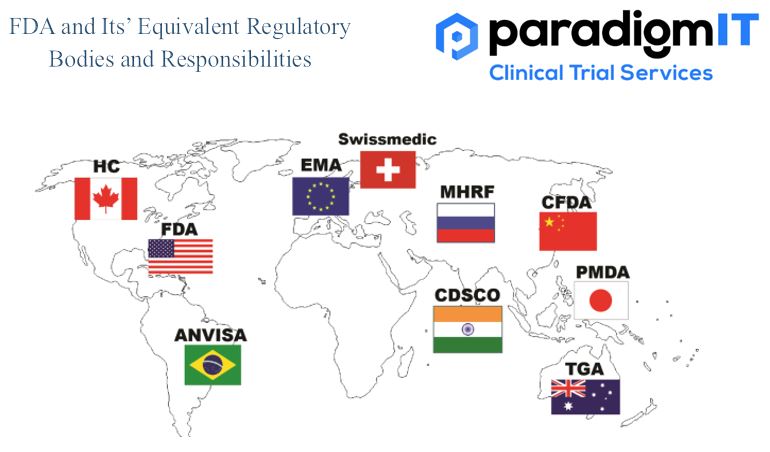The Food and Drug Administration (FDA) is a regulatory agency of the United States Department of Health and Human Services. It is responsible for protecting the public health by ensuring the safety, efficacy, and security of human and veterinary drugs, biological products, medical devices, food supply, cosmetics, and products that emit radiation.
Here are some equivalent regulatory bodies in other countries and unions, have similar roles to the FDA and work to ensure the safety, efficacy, and security of drugs, medical devices, and other products in their respective regions.
- European Medicines Agency (EMA) – responsible for the scientific evaluation of medicines for use within the European Union.
- Medicines and Healthcare products Regulatory Agency (MHRA) – for regulating medicines, medical devices, and blood components for transfusion in the UK. In December 2020, the MHRA became the first regulatory body in the world to approve a COVID-19 vaccine for emergency use.
- Pharmaceuticals and Medical Devices Agency (PMDA) – accountable for the review and approval of drugs and medical devices in Japan. The PMDA works closely with regulatory agencies in other countries, including the FDA and EMA, to facilitate the development and approval of new drugs and medical devices.
- Health Canada – responsible for regulating health products, including drugs, medical devices, and natural health products, in Canada. Health Canada has a unique mandate to assess and manage risks associated with environmental health hazards, such as chemicals, as well as health products.
- Therapeutic Goods Administration (TGA) – for regulating therapeutic goods, including prescription medicines, vaccines, medical devices, and blood products, in Australia. The TGA works closely with regulatory agencies in other countries, including the FDA and EMA, to facilitate the development and approval of new therapeutic goods.
- National Medical Products Administration (NMPA) – registration, licensing, and post-market surveillance of drugs, medical devices, and other health products are regulated by NMPA in China. The NMPA has been implementing reforms in recent years to streamline the regulatory process and increase transparency.
- Central Drugs Standard Control Organization (CDSCO) – The CDSCO is based in New Delhi, India, and is responsible for the regulation and control of pharmaceuticals and medical devices. Also accounts for implementing regulations related to clinical trials and medical research in India.
- Swissmedic – Liable for the authorization and supervision of therapeutic products, including drugs and medical devices, in Switzerland. Swissmedic also provides scientific advice and guidance to companies developing new therapeutic products.
- Federal Institute for Drugs and Medical Devices (BfArM) – The BfArM is based in Bonn, Germany, and is responsible for the authorization, supervision, and post-market surveillance of drugs and medical devices. The BfArM also works closely with other regulatory agencies in Europe to facilitate the approval of new therapeutic products.
- Health Sciences Authority (HSA) – Monitors regulation of health products, including drugs, medical devices, and traditional medicines are in Singapore. The HSA also provides scientific advice and guidance to companies developing new therapeutic products and works to promote the safety and quality of health products in Singapore.
Key Duties of Regulatory Bodies:
- Ensuring safety and efficacy of health products
- Protecting public health
- Promoting R&D and innovation
- Facilitating global harmonization
- Providing transparency and accountability
For more information –
Visit our website – www.paradigmit.com
Or you can write us at ask@paradigmit.com
Follow us for more – https://www.linkedin.com/company/paradigmittechnologyservices/?viewAsMember=true


